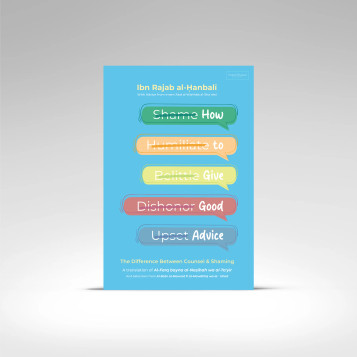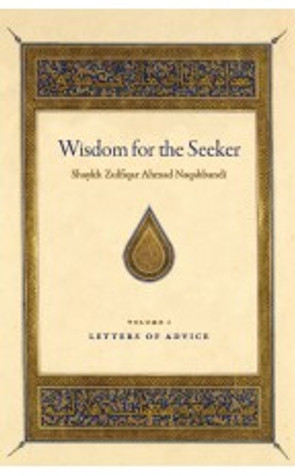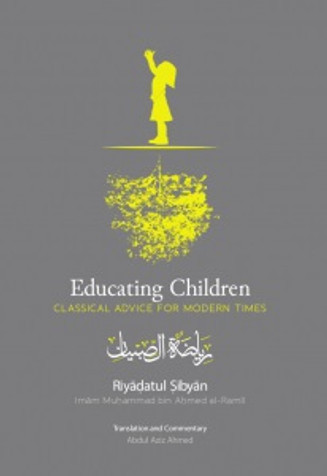How to Give Good Advice
Imam Ghazali Institute
- SKU:
- BKIGI1049
- MPN:
- 9781966329336
Title: How to Give Good Advice
Author: Imam Abd al-Rahman ibn Ahmad Ibn Rajab al-Hanbali & Imam 'Abd al-Wahhab al-Sha'rani
ISBN: 9781966329336
Publisher: Imam Ghazali Institute
Languages: Arabic & English (bilingual)
This text is a compendium of two treatises on the subject of giving advice: Ibn Rajab al-Hanbali's Al-Farq bayna al-Nasihah wa al-Ta’yir, and selected excerpts from Imam al-Sha'rani's Al-Bahr al-Mawrud fi al-Mawathiq wa al-'Uhud.
Ibn Rajab's text, whose title has been translated as "The Difference Between Counsel and Shaming," is a short treatise meant to help the reader distinguish between advice that is permissible and potentially beneficial, as opposed to that which is disliked or impermissible and potentially harmful. It includes chapters on the process for advising scholars, the difference between advising someone to leave sin as opposed to rebuking someone for sin, the characteristics of hypocritical advice and its effects, and more. Ibn Rajab's work is replete with relevant verses from the Qur'an, hadith narrations, as well as statements and stories from the Salaf and the righteous scholars. These verses and narrations serve as evidence for his arguments, as well as illustrations of the principles in action.
Imam al-Sha'rani's text, which consists of selected excerpts from a longer work, begins with a discussion of sincerity towards every Muslim, with a focus on the famous hadith in which the Prophet ﷺ stated "Religion is sincere counsel." It proceeds with a long discussion of the parameters for commanding good and forbidding evil, the process for conducting an argument, the central importance of good character, and the proper balance between not demeaning other Muslims and covering their faults, while still giving advice and preventing sin when appropriate. Similar to Ibn Rajab's text, Imam al-Sha'rani utilizes numerous verses of the Qur'an, hadith narrations, and statements and stories from the righteous among the Muslims to support his work.
Taken together, these two texts provide a concise yet comprehensive discussion of how and when to offer advice, practices and etiquettes to help make the action of giving advice praiseworthy and the advice itself more likely to be effective, and potential missteps and pitfalls to avoid in order to not incur blame or cause additional harm.
ABOUT THE AUTHORS
Imam Abd al-Rahman ibn Ahmad Ibn Rajab al-Hanbali (1335-1393) was born in Iraq to a scholarly family. During his youth, his family spent time living in a number of the major centers of knowledge in the Muslim world, including Baghdad, Damascus, Jerusalem, Egypt, and Makkah. He studied under many of the greatest scholars of his era, including al-Subki, Hafiz al-Iraqi, Ibn Qayyim al-Jawziyyah, and many others. Among his best-known works are Jami' al-Ulum wa al-Hikam, one of the most important commentaries on the Arba'in of Imam al-Nawawi, and Fath al-Bari, an unfinished commentary on Sahih al-Bukhari that lent its name to Ibn Hajar's complete commentary some decades later. He returned to Allah in Damascus and is buried in the famous Baab as-Sagheer cemetary.
Imam Abd al-Wahhab al-Sha'rani (1492/3–1565) was a distinguished Ottoman-Egyptian scholar of the 16th century. Born near Cairo, he mastered Islamic jurisprudence, theology, and Tasawwuf from a young age, despite losing his father early. Studying at Al-Azhar University, he became proficient in all four Sunni legal schools of thought and memorized numerous religious texts. He is recognized as a leading figure and reviver of Islam in the 16th century. His contributions played a significant role in rejuvenating Islamic thought and practice, and he stands out as one of the most prolific authors of the early Ottoman-Egyptian era.
 Canadian Dollar
Canadian Dollar















